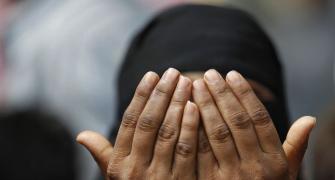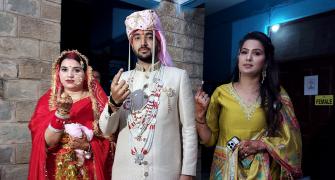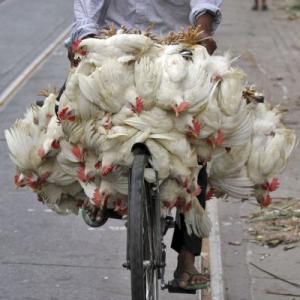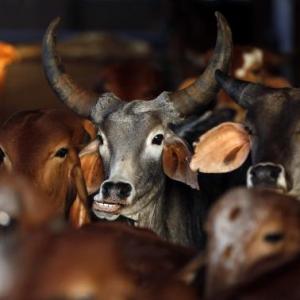'There is a remarkable link between the eating of beef (or at the very least, tolerating the eating of beef) and India being a superpower.'
'In India, whenever an empire was strong, religion took a back seat.'
'Alternatively, whenever religion asserted itself, the main empire of India crumbled...'
'By seeking to ban beef in every state that it rules, the BJP may well be taking India on the route to becoming a weakling,' warns Amberish K Diwanji.
The Bharatiya Janata Party-led government in Maharashtra has chosen to ban beef derived from oxen.
Many are up in arms against the move, saying it is aimed at harassing the Muslims and Christians, in particular, and against all non-vegetarians in general (including Hindus) since the cost of other meat will go up with the non-availability of beef in the market. Similar steps have been taken by BJP governments in other states.
For the BJP, banning the slaughter of bulls and oxen (the killing of cows was banned decades ago by the Congress) is part of its aim to assert the nation's Hindu identity.
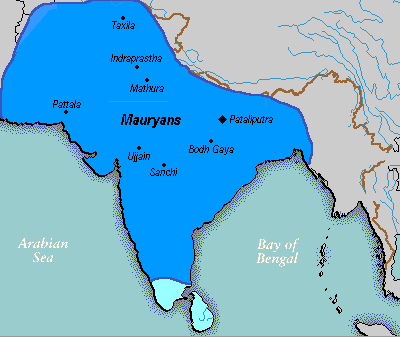
But the BJP also styles itself as a nationalist government committed to turning India into a superpower. It often recalls a glorious Hindu past, harking back to the likes of Chandragupta Maurya, Ashoka, Chandragupta and Samudragupta, and Harshvardhan. This was in the millennium before Muslims hordes entered India (though Arabs had captured Sind in the 8th century).
The problem is that there is a remarkable link between the eating of beef (or at the very least, tolerating the eating of beef) and India being a superpower. Put another way: In India, whenever an empire was strong, religion took a back seat.
Alternatively, whenever religion asserted itself, the main empire of India crumbled and was soon destroyed by another power, either from within India or from outside India.
Today, by seeking to ban beef in every state that it rules and across India, the BJP may well be taking India on the route to becoming a weakling.
In ancient India, killing and consuming animals was part and parcel of life of all. Hindus then were overwhelmingly non-vegetarian. There are historians who have pointed out that back then Hindus ate beef. And back then, India was never conquered. Never!
Even the mighty Alexander (hailed as 'the Great' by Western historians) merely conquered the Punjab; his troops, fearful of facing the might of Magadha, preferred to return home. It was a Russian historian or military officer (regretfully I can't recall his name) who pointed out that rather than mutiny, as claimed by Western historians, Alexander's troops might have simply refused to fight Magadha after the bruising victory over Porus. The homesickness myth was merely created to explain away this embarrassing retreat across the Indus.
The Magadha Empire was followed by the Gupta Empire, and later that of Harshvardhan, all before or during the first millennium of the Common Era (CE), a time when, historians tell us, Hindus ate not just meat but also beef. Meat eating then was common practice (and caste was based on profession, not birth).
The very fact that Buddhism, which was born and blossomed in north India circa 200-300 BCE (Before CE), places absolutely no restriction on eating beef shows that back then, there was no restriction on eating beef among the Hindus, which practice Buddhism followed.
By contrast, Sikhism, born more than 1,500 years later in northwest India, accepted the then prevailing practice of not consuming beef (even as Sikhs devour other meat).
In contrast, Jainism, born around the same time as Buddhism, banned the killing of all animals, thus forever restricting itself to a narrow fringe of followers such as traders.
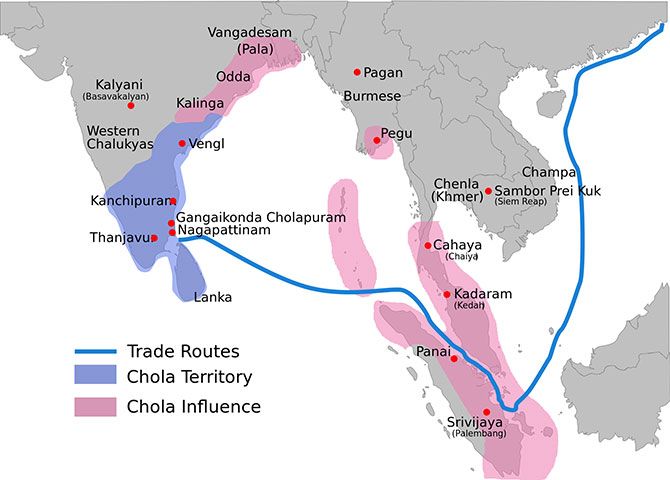
But do note, when consuming meat and beef was common practice, it was Hindu emperors who ruled over this huge subcontinent. Similarly, at the cusp of the first and second millennia CE, the Chola Empire, with meat-eating kings and soldiers, achieved unmatched glory in creating a maritime empire as far as Indonesia.
A later legatee of this empire, a Hindu based in Southeast Asia, would create the world's largest temple in faraway Angkor Wat of Kampuchea (Cambodia).
Towards the end of the first millennium CE, some changes took place in India. Buddhism waned and Hinduism, with a system of caste based on birth, reasserted itself. The revival was led by Adi Sankaracharya. Somewhere around this time, some castes chose to distinguish themselves from the Hindu masses by resorting to vegetarianism.
Brahmins, who had overcome the challenge of Buddhism, increasingly became vegetarian, along with the Banias (who were strongly influenced by the Jains). Why this happened is not yet very clear.
Simultaneously, there was born the ridiculous myth of vegetarian diet being 'superior' to the non-vegetarian diet, if only to help the Brahmin assert his own superiority over the other castes.
Now the coincidence: As vegetarianism spread among the influential sections of the Hindus, they suffered repeated defeats. Through the second millennium CE, Hindus would never rule over the larger part of India (till 1947), and would be subjugated to empires that were created by Turks, Afghans, Mughals, Portuguese, and lastly the British.
All of them meat eaters, all of them beef eaters. The only Hindus who came close to ruling India were the Marathas (who love their mutton!).
A professor of comparative religions, Arvind Sharma, has argued that Hindus turning away from beef actually happened after Hindus lost political power to the Muslims. Not killing the cow became a mark of identity and faith.
The theory is that Hindus stopped eating beef as a cultural assertion and reaction to the presence of Muslims in their midst, similar to Brahmins turning completely vegetarian to stand out among fellow Hindus.
There is merit in this argument: One tends to assert one's identity when feeling threatened. Just see how Indians abroad behave!
The rise and fall of empires is much more than just diet. When a Rajput defeated a fellow Rajput, they both shared similar diets, as did the different Muslims kings who fought each other (Turks, Afghans, Mughals), and later when the Portuguese and British faced each other.
Many, many factors go into the rise and fall of empires (it is an entire subject by itself). The better known reasons include politics, population, economic power, and military prowess.
There are also other reasons such as the role of religion (usually negative), social factors, and technological advancement (which, in itself, is a reflection of society).
But what is undeniable about the history of India is that those who ruled India for most of the first and second millennia, regardless of religion, ate meat. And beef. Let us ponder that thought as we go about banning various forms of beef.
Yet, eating or not eating beef is not really the issue. It is merely a reflection of the tolerance that the ruling class shows for the people and their faiths. What is undeniable in India is the inverse link between a strong State and secularism (howsoever defined).
In India, whenever religion has asserted itself, the State (empire or kingdom) has crumbled (sooner or later).
Alternatively, whenever a ruler kept religion (and religious practices howsoever important for the followers of that faith) at bay, that kingdom became an empire, and the empire in turn prospered.
Thus, Asoka's turn to Buddhism led to his empire ending within years of his demise. Akbar's secularism saw him create a strong Mughal empire, one of the mightiest in the world then (exactly what we aspire for India today), but with a few decades of his death, Aurangzeb's religious policies saw the Mughal empire crumble from within.
Less well known is that the Peshwas's increased religiosity is probably what stopped the Marathas from replacing the Mughals.
For instance, before the Third Battle of Panipat, the Marathas had in tow some 30,000 pilgrims keen to visit the temple towns of north India. Pilgrims accompanying an army! Then, when cholera broke out in the enemy camp and the best strategy would have been to attack (in the December 1760-January 1761 period), religious considerations about an auspicious time meant the Marathas waited till the day of Makar Sankranti.
How can religion decide battle tactics? A far cry from the time when Shivaji decided his battle plans based on intelligence, not religion. The Portuguese failed to build an empire because they were too busy converting people to Christianity, and turning the general public against them.
By contrast, the East India Company kept religion at bay even as its plunder activities turned to empire building.
In that context, the increasing Hinduisation of India, the determination of some politicians to assert the Hindu religion within India, is the recipe for the weakening of India. If that should happen it is just a matter of time before India weakens internally.
THE EXAMPLE OF GUJARAT
Gujaratis are perceived as being overwhelmingly vegetarian. They are not; but the dominant castes, such as the Jains, Banias, Brahmins, and Patidars are vegetarian. When under British rule, as the trading class of Gujaratis (vegetarian) set up trading post across India and the world, they gave the impression of a vegetarian Gujarat.
M K Gandhi, a Modh Bania, and Vallabhbhai Patel, a Patidar, further cemented the notion of Gujaratis as vegetarian. It is true that many Gujaratis are vegetarian. But not all! And no one can deny that Gujaratis are one of India's most successful communities in the commercial world.
While the Gujaratis's commercial success is undeniable, their military history is marked with failure. Gujarat (or what is now Gujarat) is one of India's most conquered states, having come under the Rajputs, Turks, Afghans, Mughals, Marathas, and finally the British. Excluding the British, the others over time became a part of the state.
While Gujarati society makes a virtue of being vegetarian, it has not helped fend off invaders.
There is nothing wrong in being vegetarian. It is every person's personal choice. There is, however, everything wrong in believing, and propagating, howsoever latently, the notion that vegetarian societies or people are superior. Or that a country is better for it.
The history of India, and Gujarat, shows that those not tolerating beef or meat, sooner or later, come under the rule of invaders. Let those who seek to ban beef realise that behind great powers have been meat consumers.
ALSO READ
Images: Top: The Mauryan Empire at its zenith.
Bottom: The Chola Empire at its zenith. Images: Kind courtesy Wikipedia


